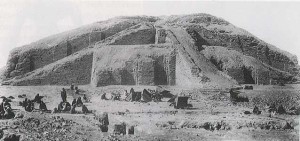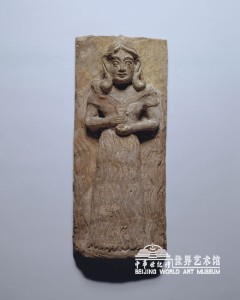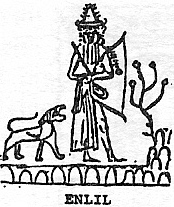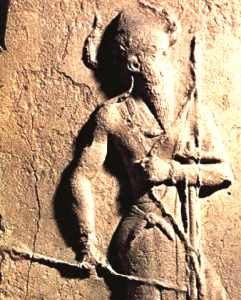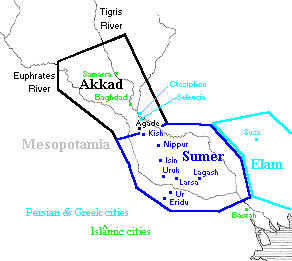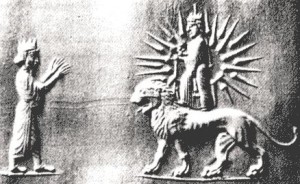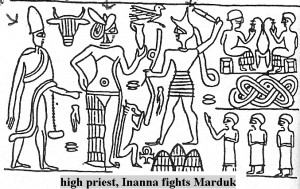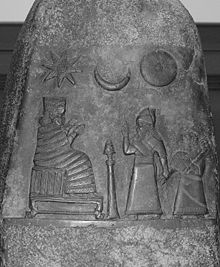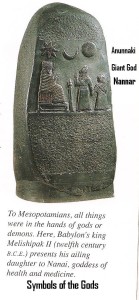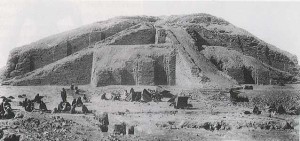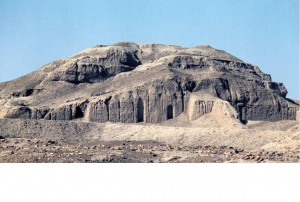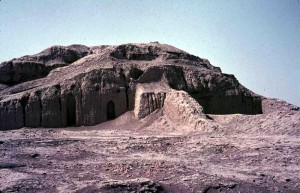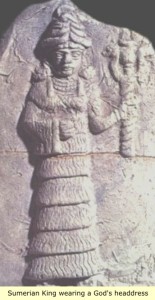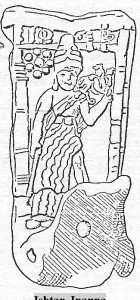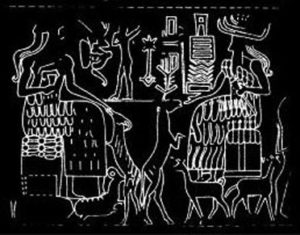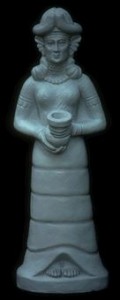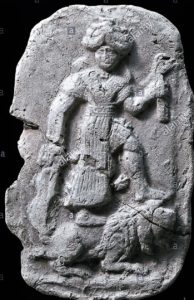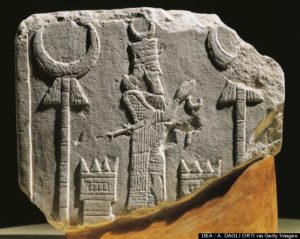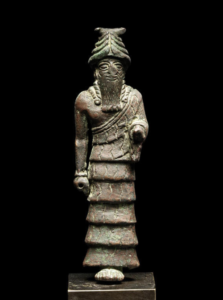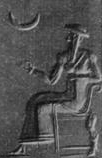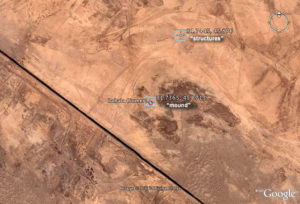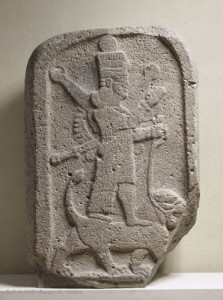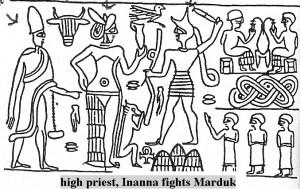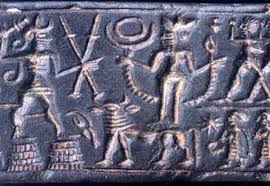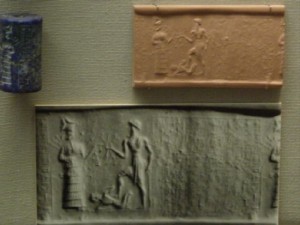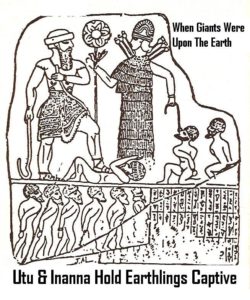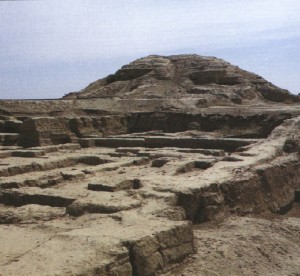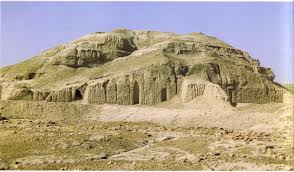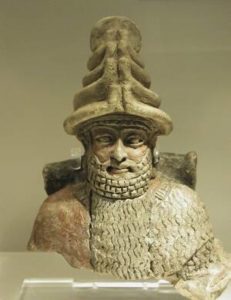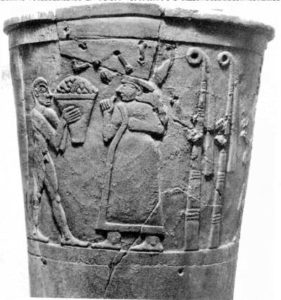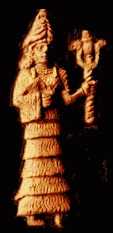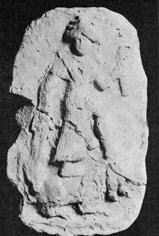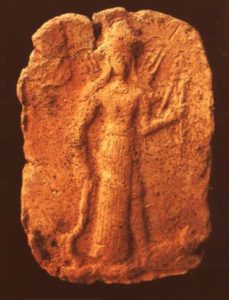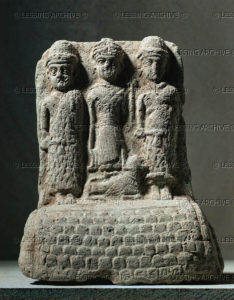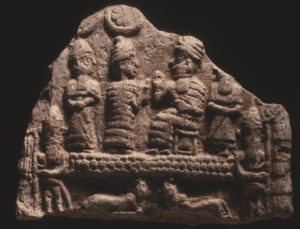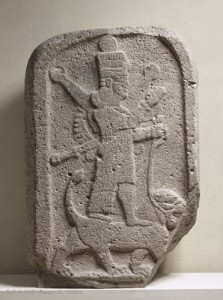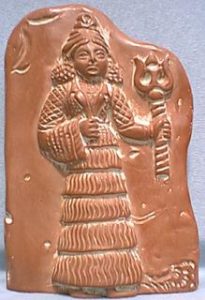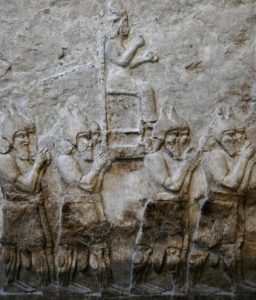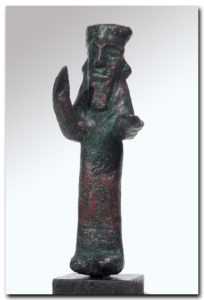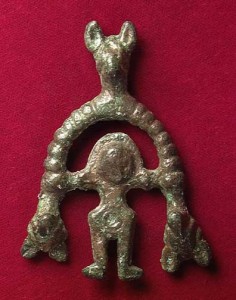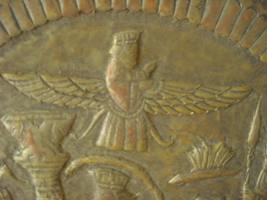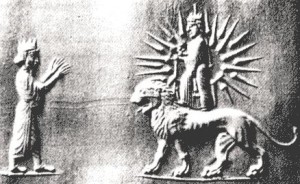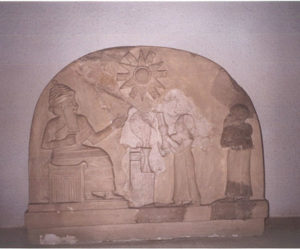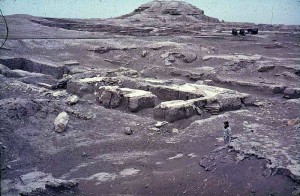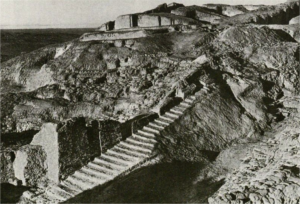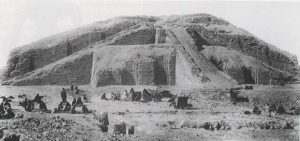Source: Black, J. A., Cunningham, G., Robson, E and Zólyomi, G.
The Electronic Text Corpus of Sumerian Literature,
Oxford University, UK, 1998 – © All rights reserved to authors. Text reproduced here for aid in studies and research purposes
(Texts: All Artifacts, Color Coding, & Writings in Bold Type With Italics Inside Parenthesis, are Added by Editor R. Brown, not the Authors, Translators, or Publishers!)
(gods in blue …mixed-breed demigods in teal…)
SEGMENT A
(beginning of 1st kirugu)
1-3 The …… which had developed — its wiping clean (?) was to be accomplished (?).
The …… of heaven and earth put their divine powers …… to sleep (?).
1 line fragmentary
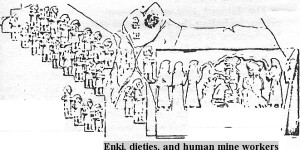 (earthling workers provided to the giant alien gods)
(earthling workers provided to the giant alien gods)
4-8 …… mortal man multiplied to become as numerous as the gods.
When together …… had achieved a momentous decision, the …… of the gods …….
Enki and Ninki (Enki‘s spouse) determined the consensus — deemed worthless.
Enul (Enlil) and Ninul (Ninlil) assigned the fate, …….
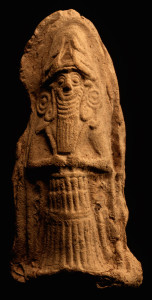
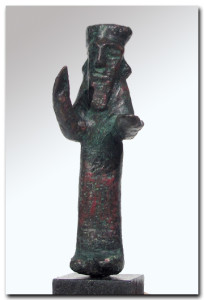 (alien King An / Anu; his son & heir Enlil)
(alien King An / Anu; his son & heir Enlil)
9-14 When together An and Enlil had created it, that one resembled …….
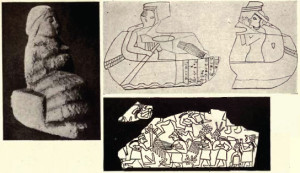 (Ninlil, spouse to Enlil, his equal in authority)
(Ninlil, spouse to Enlil, his equal in authority)
When Ninlil had given it features, that one was fit for …….
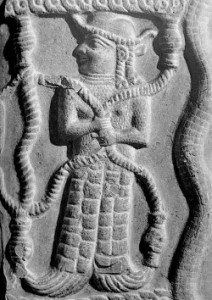
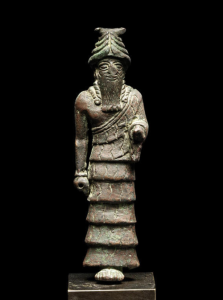
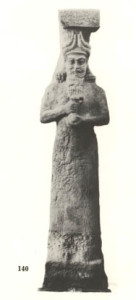
(Ninhursag / Aruru Nannar Enki)
When together Aruru (Ninhursag), Suen (Nannar) and Enki had fashioned its limbs,
that one turned pitch black, as at night, halfway through the watch, …….
All the great gods paled at its immensity and…… was brought about.
Like a great wild bull which bellows mightily, that one filled the world with its roar.
15-20 As its gigantic horns reached up to heaven, who trembled in his very core?
As it was piled up over the mountains like a battle-net, who turned away?
Who caused wailing and lamenting in those streets and ……?
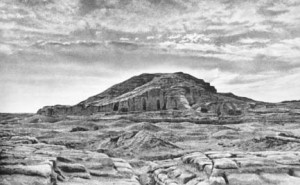 (ruins of Uruk, one of the 1st cities on Earth, & house of Anu way above)
(ruins of Uruk, one of the 1st cities on Earth, & house of Anu way above)
Unug (Uruk), like a loyal citizen in terror, set up an alarm (and exclaimed)
“Rise up!” Why did its hand seize Unug?
Why did the benevolent eye look away?
Who brought about such worry and lamenting and ……?
21-27 That one drew nearer.
That one settled upon the ground.
Why would he withdraw?
Who distorted Unug’s good sense and deranged its good counsel?
Who smashed its good udug deity?
Who struck its good lama deity too?
Who desecrated the fearsome radiance which crowned it?
Who brought about mob panic in Unug?
Who …… sickness too?
Along with the city, the foreign lands ……, who …… in the temple of Unug?
That one ……..
small no. of lines missing
SEGMENT B
(continuation of 1st kirugu)
1-8 1 line fragmentary
Who made ……?
Why was …… expanded?
Who made the black-headed people (modern earthlings) become so numerous?
Who overthrew ……? …… was destroyed — who restored ……?
Who confronted ……?
That one crushed …….
That one …….
small no. of lines missing
SEGMENT C
(probable beginning of 2nd kirugu)
1-9 1 line fragmentary
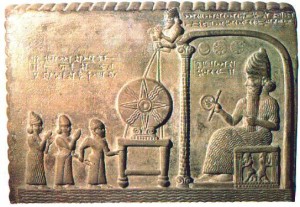 (2 giant alien gods & king, Utu with the Wheel of Justice)
(2 giant alien gods & king, Utu with the Wheel of Justice)
…… and Utu, who in human form renders judgment at the law court of heaven, set and did not rise again.
…… bore a heavy burden of sin.
…… the altered verdicts of the lord Nunamnir (Enlil).
…… who can smite ……? …… and they approach (?).
…… he brings …… forth.
…… of Enlil …….
He …… and puts an end to …….
small no. of lines missing
SEGMENT D
(continuation of 2nd kirugu)
1-9 1 line fragmentary
…… each and every one ……. …… its ways were ……. …… its destruction and demolition, …….
The …… of the gods …… attention.
……, who neglected ……, …… the city watched as the evil ghost approached.
……breathed painfully, he wept bitterly.
…… there was no nodding of the head.
10-20 He consoled himself with tears and laments — the city trembled.
A defiled hand smote him and flattened his skull — the city collapsed.
The fearsome radiance overwhelmed each and every observer (?).
The capital city, canal inspector for all the lands, became like one who spreads havoc.
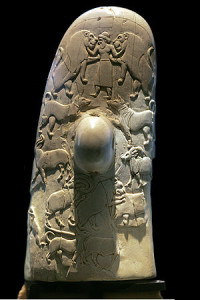 (Nannar‘s cattle pens feeding the gods of Sumer, ivory carving)
(Nannar‘s cattle pens feeding the gods of Sumer, ivory carving)
The faithful cowherds themselves overturned every single cattlepen.
The chief shepherds themselves burned (?) every sheepfold.
They built them up like grain heaps, they spread them out like grain piles, they themselves flattened them.
…… they drenched the fields with water, they turned the city into a swamp.
They did all that.
Like reeds in a wasteland, life could not be revived.
They brought ruination.
Evil things menaced (?) the city.
A hush settled over the awed hearts of its people like a cloak.
21-33 Its good udug deities went away, its lama deities ran off.
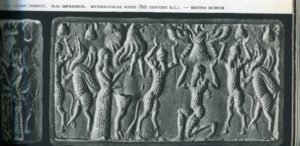 (aliens on Earth & in the sky)
(aliens on Earth & in the sky)
Its lama deity (said) “Hide in the open country” and they took foreign paths.
The city’s patron god turned against it and its shepherd abandoned it.
Its guardian spirit, though not an enemy, was exiled (?) to a foreign place.
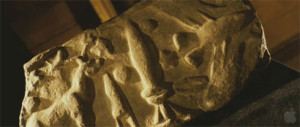
(Hittite battle scene artifact, missiles launched by the alien gods)
Thus all its most important gods evacuated Unug, they kept away from it.
They hid out in the hills and wandered (?) about in the haunted plains.
In the city built upon peace, food and drink were overturned like a saman vessel.
In the pasture lands a tumultuous noise arose, the asses and sheep were driven away.
Elderly people and babies, taking their rest, …… in front …….
They saw …… and slaughtered (?) …….
3 lines fragmentary
small no. of lines missing
SEGMENT E
(continuation of 2nd kirugu)
1-7 He …… and opened his clenched fist.
He …… and reached out his hand.
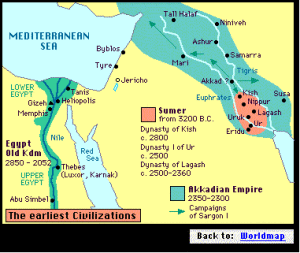 (1st cities on Earth, established by alien gods)
(1st cities on Earth, established by alien gods)
The …… of Sumer, the city whose king crossed over to an enemy land,
to ……. — he smote it with the might of his weapon.
He …… and turned the place into dust.
He …… and piled the people up in heaps.
…… when will its charms be restored?
8 2nd kirugu.
9 The …… of heaven …… and the people …… to the limits of heaven.
10 Its jicgijal.
11-20 He ……, stretched forth his hand and induced terror in the land.
Enlil struck out with great ferocity.
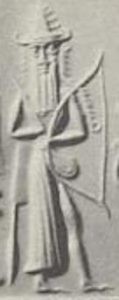
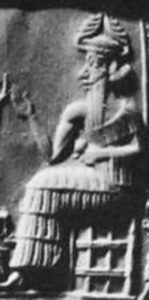 (Enlil, Earth Colony Commander, Anu‘s son & heir to Heaven / Nibiru & Earth Colony)
(Enlil, Earth Colony Commander, Anu‘s son & heir to Heaven / Nibiru & Earth Colony)
He announced: “A devastating deluge shall be invoked.
At its front war shall be a …… ax, at its rear it shall be a …….
Its scales shall be a harrow, its back shall be flames.
Its countenance shall be a malevolent storm that enshrouds heaven and earth.
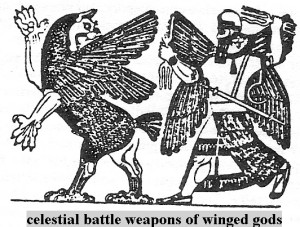 (Anzu vrs. Ninurta, battle for Enlil‘s rightful control over Earth)
(Anzu vrs. Ninurta, battle for Enlil‘s rightful control over Earth)
The glint of its eyes shall be lightning that flashes far like the Anzud bird.
Its mouth shall be grotesque — a blaze that extends as far as the nether world.
Its tongue shall be an inferno, raining embers, that sunders the Land.
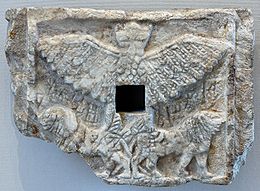 (Anzud bird, Ninurta‘s storm bird named after Anzu)
(Anzud bird, Ninurta‘s storm bird named after Anzu)
Its arms shall be the majestic Anzud (Anzu) bird that nothing can escape when it spreads wide its talons.”
21-31 “Its ribs shall be crowbars that let light pass inside like the sun’s rays.
Knotted at both its hips shall be city-destroying slingstones (alien technologies).
Its great haunches shall be dripping knives, covered with gore, that make blood flow.
Its muscles shall be saws that slash, its feet those of an eagle.
It shall make the Tigris and Euphrates quaver, it shall make the mountains rumble.
At its reverberation the hills shall be uprooted, the people shall be pitched about like sheaves,
Sumer and Akkad shall shiver, they shall be flooded like a harvest crop.
The foolish shall rejoice, they shall exclaim:
“Let it come — we shall be seeing war and battle in the city, how the sacred precinct (?) is destroyed,
how the walls are battered down, how the city’s peace is disrupted,
how among the loyal families honest men are transformed into traitors.”
32-40 “But the sensible shall beat their breasts and droop (?) their heads.
At midnight they shall toss about tearfully and suffer insomnia.
In bed, under the covers, they shall be unable to sleep soundly, they shall wander about the city.”
They shall wring their hands, their courage shall run out:
“May our allies serving in times of war mobilize their forces for peace.
May the word of Enlil be sent back, may it turn tail.
May the venom of Nunamnir‘s (Enlil) anger become exhausted.
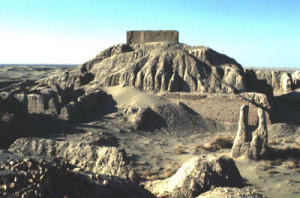 (E-kur, Enlil‘s mud-brick mountain home on Earth Colony in Nippur)
(E-kur, Enlil‘s mud-brick mountain home on Earth Colony in Nippur)
May those vicious men who have seized the E-kur (Enlil‘s temple residence) be punished.
May those who have set their sight upon Nibru (Nippur) be swept away.”
41 3rd kirugu.
42 My heart is filled with sorrow, I am tear-stricken.
43 Its jicgijal.
44-50 Oh, Sumer! Alas — your spirit!
Alas — your structure!
Alas — your people!
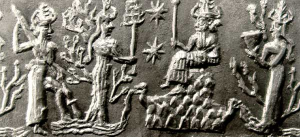
(Enlil Ninhursag Anu Inanna)
The word of An (Anu), having been assigned its place, has destroyed the sacred precinct (?).
The pronouncement of Enlil, having been set in motion, …….
The devastating deluge …….
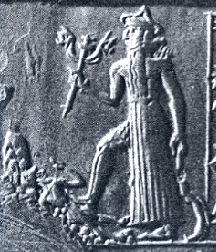 (warrior god Nergal, god of the Under World, with his high-tech alien weaponry)
(warrior god Nergal, god of the Under World, with his high-tech alien weaponry)
The great and fierce ……, the lord Nergal …….
…… like Gibil, Nergal (Enki‘s sons)…….
1 line fragmentary
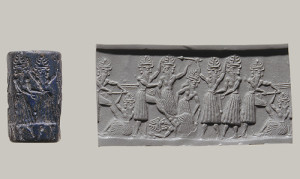 (wars between royal alien princes, caused their loyal earthlings to war against each other)
(wars between royal alien princes, caused their loyal earthlings to war against each other)
51-65 War …… enemy lands …… echoed.
Like arrows in a quiver …….
Evildoers in Sumer…….Gutium, the enemy, overturned ……. Sumer, caught in a trap, …….
Its people were thrown into turmoil …….
The mighty heroes of Sumer ……. …… the heart of a hurricane …….
They advanced like the front rank of troops, …….
Like …… they were crushed, every one of them …….
Their war veterans gave up, their brains were muddled.
The troop leaders, the most outstanding of the men, were viciously hewn down.
Gutium, the enemy, …… weapons …….
Not looking at each other ……
Like a swelling flood, like ……, Subir poured into Sumer.
66-74 They …… like stampeding goats, they tore apart the corpses of the population.
They mutilated Sumer and Akkad, they pulverized it as with a pestle.
They destroyed its settlements and habitations, they razed them to ruin mounds.
The best of Sumer they scattered like dust, they heaped up …….
They massacred its populace, they finished off young and old alike.
They destroyed the city of the Anuna (Anunnaki) gods, they set it aflame.
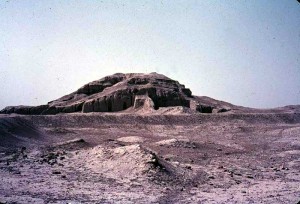 (Anu‘s ziggurat residence discovered 1st, then city of Uruk)
(Anu‘s ziggurat residence discovered 1st, then city of Uruk)
They put out both Unug’s (Uruk / Erech) eyes, they uprooted its young shoots.
They wandered all through the libation places of the Anuna gods.
And even Kulaba, which is the primeval city, they turned into a place of murder.
75 4th kirugu.
76 Alas — Sumer! Alas — its people!
77 Its jicgijal.
78-88 Unug! They seized your wharf and your borders and …….
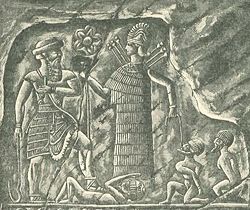 (Utu, earthling under-foot, twin sister Inanna, & captured earthling with nose ring)
(Utu, earthling under-foot, twin sister Inanna, & captured earthling with nose ring)
At Unug shouts rang out, screams reverberated, its captured men …….
The noise reached to the south.
The south was destroyed and …….
The impact forced its way to the uplands.
The uplands were struck and …….
To the right and left no people moved about, no habitations were built.
There was no …… and the mobilization of troops did not ……. …… rose up to heaven.
Heaven perished and its strength did not ……. …… upon the earth.
The earth was scattered, and it did not …….
All the settlements were dispersed — Unug stood all alone.
It was a bull, it was a champion, it was immense with pride, but it …… to the weapons.
All night and even until midday battle was waged, and afterwards it did not …….
89-99 Battering rams and shields were set up, they rent its walls.
They breached its buttresses, they hewed the city with axes.
They set fire to its stations, they …… the city’s dwellings.
They destroyed it, they demolished it.
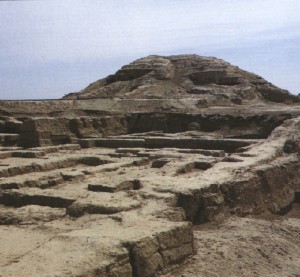 (ruins of Uruk below Anu‘s mud-brick-built mountain / residence)
(ruins of Uruk below Anu‘s mud-brick-built mountain / residence)
Unug, the good place, was …… with dust.
Like a great wild bull wounded with an arrow, …….
Like a wild cow pierced with a spear, …….
The mighty one rushed with his weapons and …… implements of war.
Subir, rising up like a swelling floodwave, …….
They trampled (?) through the streets and …….
They let the blood of the people flow like that of a sacrificial cow, they tore out everything that had been built.
100-111 The citizens of Unug …….
They…… and threw down …….
They …… and put an end to …….
They seized …….
They struck …….
They destroyed …….
They ……
They demolished …….
They set up …….
They heaped up …….
They put an end to …… and did not leave behind ……. …… Subir entered ……
112 5th kirugu.
113 …… cried out “…… has been created” and he smeared dust ……
114 Its jicgijal.
115 …… reached ……
19 fragmentary lines
unknown no. of lines missing
SEGMENT F
(probable beginning of another kirugu)
1-5 The enemy land ……. Zabalam …….
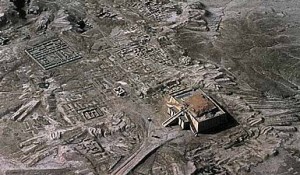 (E-kishnugal ziggurat)
(E-kishnugal ziggurat)
(Ur, Nannar‘s patron city with his temple residence / man-made mountain home way above prodding earthlings)
In Urim (Ur), the E-kic-nu-jal …….
Cattlepen and sheepfold ……, evil …….
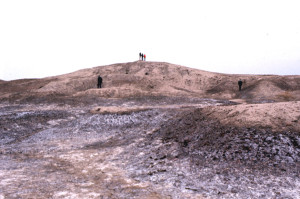 (Sippar ruins, Utu‘s patron city)
(Sippar ruins, Utu‘s patron city)
The land of Subir (Sippar) …….
200-300 lines missing
SEGMENT G
(part of 11th kirugu)
1-5 All the great gods …….
The Anuna gods…….
1 line fragmentary
Sovereigns …….
1 line fragmentary
unknown no. of lines missing
SEGMENT H
(beginning of 12th kirugu)
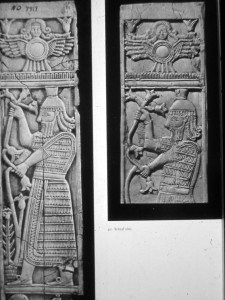
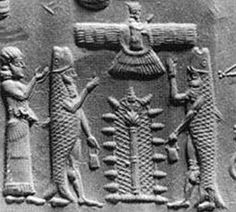
(Inanna hovering in her sky-disc above her appointed kings, giving protection & direction to many; & hovering Anu)
1-8 Lady Inanna whose greatness is vaster than the mountains, hovering like An, vested with grandeur like Enlil,
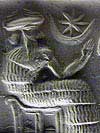 (Nannar, Moon Crescent God of Ur, Inanna‘s father, & her 8-Pointed Star symbol of Venus)
(Nannar, Moon Crescent God of Ur, Inanna‘s father, & her 8-Pointed Star symbol of Venus)
like her father (Nannar), perfect by night and in the heat of the day,
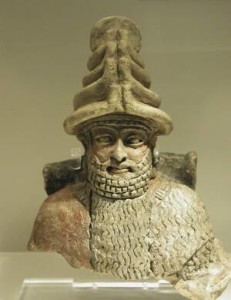 (Utu / Shamash / Allah, Nannar‘s son, & Inanna‘s twin brother, The Sun God)
(Utu / Shamash / Allah, Nannar‘s son, & Inanna‘s twin brother, The Sun God)
like Utu (Nannar‘s son), surpassing in vigor, singularly exalted in all the four regions —
let Icme-Dagan take pleasure in relaxing in your temple, let him murmur to you in your temple,
let him raise his head to you in your E-ana (Anu‘s temple residence in Uruk).
9-19 Let (semi-divine mixed-breed king of Isin) Icme-Dagan serve you as your steward.
Let him prepare great bulls for you.
Let him dedicate great offerings to you.
Let him make the beer, fat and oil plentiful for you.
Let him make syrup and wine flow for you as from stone jars.
Let Icme-Dagan, (giant semi-divine butler & descendant) son of Enlil on the king’s pedestal, bow in homage to you.
May he make the ub and ala drums resound grandly for you.
May the tigi sound sweetly for you, and may the zamzam play for you.
May they play …… on the tigi for you, expressing your prayers and supplications before you.
20-27 In bringing forth ……, all that there are, at your E-jipar in Unug,
as a humble man who has grasped your feet, as a pious one who has experienced your exaltedness,
he has brought a lament as offering to you and will …….
As for everything that happened to Sumer and Akkad,
which he has witnessed in Unug, the aggrieved place, may the best singers perform songs there.
28-38 If the Anuna gods emerge tearfully, let them promise to us that as it was when heaven and earth came about,
nothing of that time shall be changed.
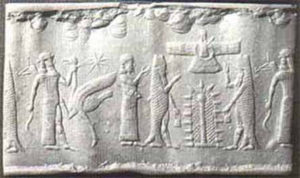 (An / Anu, father in Heaven / planet Nibiru in his winged sky-disc)
(An / Anu, father in Heaven / planet Nibiru in his winged sky-disc)
If An (Anu) looks kindly upon that man and at the well-built city, the place of determining fate, proclaim “Man and city!
Life and well-being!” for him. Let praises ring out.
Let him be made surpassing above all, to his right or left.
Tireless lama deity, take hold of his head, pronounce his fate in charitable words —
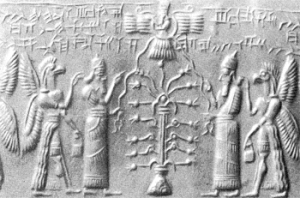 (Apkulla pilot, Enki, Anu in his winged sky-disc, Enlil, & winged eagle-headed Apkulla pilot)
(Apkulla pilot, Enki, Anu in his winged sky-disc, Enlil, & winged eagle-headed Apkulla pilot)
by the command of An and Enlil it will remain unaltered for a long time.
9 12th kirugu.
